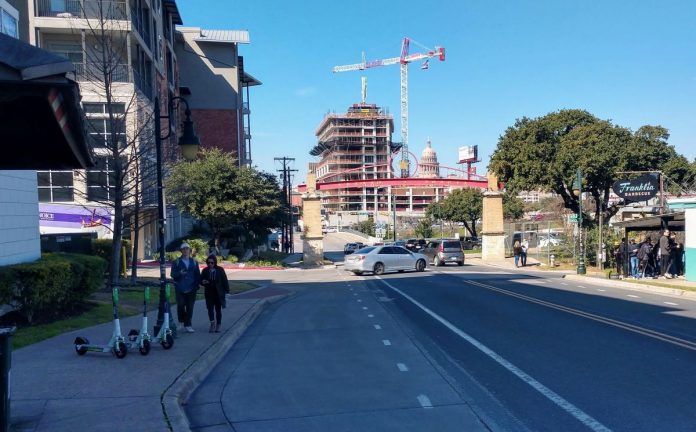Scootershare finally got the go ahead on Monday as the Seattle City Council voted eight-to-one to approve a pilot program. Transportation Chair Alex Pedersen was the only no vote on the legislation, which permits scooters on streets, bike lanes, and recreational trails, but prohibits riding them on most sidewalks. The primary exception is where the sidewalk functions as an extension of a multi-use trail.
The pilot program allows for up to three providers initially with 500 e-scooters each, but then going up to 2,000 each in the second phase of the pilot–provided they pay the $150 per vehicle fee authorized in the legislation. The City has promised one of the permits to Lime since they are the only bikeshare provider still operating in Seattle and are keen on operating scootershare, too. The other two provider slots are up for grabs, but the Seattle Department of Transportation (SDOT) is seeking one seated scooter operator and one standing scooter operator.
Standing scooters have made up the bulk of the national scootershare market thus far, but SDOT believes having some seated scooters could expand the accessibility of the program and may be safer.
Safety concerns have been among the biggest stumbling blocks delaying the pilot. Many peer cities have had scootershare programs for several years now, and Seattle has debated joining the pack since 2018 (or earlier) and has been weighing pilot program legislation since early 2019. However, Mayor Jenny Durkan was adamant that scooters were risky and dangerous, saying “ask the trauma docs.” Beyond public safety, she worried about the City’s liability in injury lawsuits.
In an effort to curb crashes caused by inexperienced riders and excessive speeds, the pilot program caps the speed on a user’s first ride at 8 miles per hour, and 15 miles per hour thereafter. The speed controls seem like a promising safety innovation–if only we had them for cars, too.
Despite Chair Pedersen’s opposition, Transportation Vice Chair Dan Strauss insisted that the more abstract debate would only get them so far and it was time to start the pilot program to get real results to study. With the winter rain and cold on the horizon, the City and providers were hoping to get some pleasant fall months to introduce scootershare.
Lime is pledging its scooters will hit the streets soon. SDOT won’t start approving the permits until at least three have been submitted by providers, but it’s likely providers won’t dally too long to get their paperwork in order given the limited spots. Scootershare has already turned into a multi-billion dollar industry fed for a–for now–steady stream of venture capital.
Lime stressed the industry’s environmental credentials in its statement following the vote.
“Seattle is taking another major step toward a more sustainable future,” said Jonathan Hopkins, Director of Strategic Development for the Northwest. “It’s now more important than ever for residents to have safe, socially-distant transportation options–like bikes and scooters–that can help reduce car congestion. We applaud the council for its vision and look forward to serving Seattle residents with e-bikes and scooters for many years to come.”
Part of the downside of the volatile bikeshare and scootershare industry is that many operations haven’t lasted much longer than a year, and the equipment has been treated as disposable in some cases, even if they are nearly brand new. Uber reportedly scrapped 20,000 of its Jump bikes after selling its operation to Lime earlier this year, in an apparent act of sabotage and effort to protect proprietary technology.
If the industry is just dabbling rather than building a lasting operation, it’s hard to weigh the climate benefits as too significant. As with electric cars, the benefits have to outweigh the embodied carbon of the vehicles and any climate cost of the electricity.
That said, some promising news is that more than a quarter of scootershare trips have replaced car trips according to SDOT research, which suggests the potential to reduce emissions and traffic congestion really is there. So let’s get scooting.
Doug Trumm is publisher of The Urbanist. An Urbanist writer since 2015, he dreams of pedestrian streets, bus lanes, and a mass-timber building spree to end our housing crisis. He graduated from the Evans School of Public Policy and Governance at the University of Washington in 2019. He lives in Seattle's Fremont neighborhood and loves to explore the city by foot and by bike.



